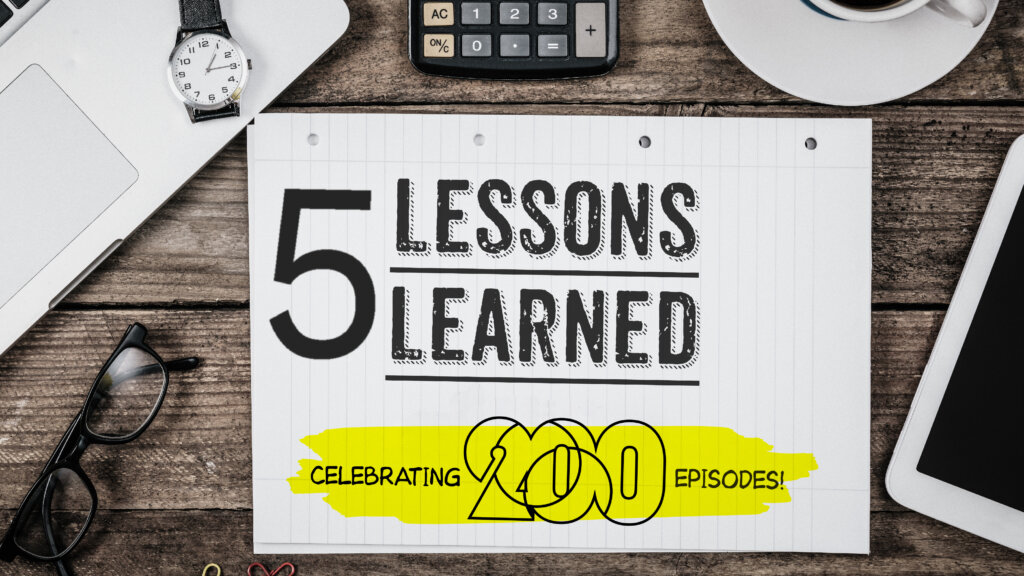Executive Podcast #200: Five Lessons Learned from the Past 200 Episodes

After 200 podcast episodes, Chris and Perry share 5 lesson they have learned that apply to every
Want to enhance your organization’s leadership culture? Learn more about our 5 Levels of Leadership private workshops HERE – Offered virtually and on-site to meet your organization’s health guidelines.
Download our Learning Guide for this podcast!
Perry Holley:
Welcome to the Maxwell Leadership Executive Podcast, where our goal is to help you increase your reputation as a leader, increase your ability to influence others, and increase your ability to fully engage your team to deliver remarkable results. Hi, I’m Perry Holley, a Maxwell leadership facilitator and coach.
Chris Goede:
And I’m Chris Goede, executive vice president with Maxwell Leadership. Welcome, and thank you for joining. As we get started today, I want to encourage you to visit Maxwellleadership.com/podcast. There you can find out more about the five levels of leadership, which is really the basis of everything that we do in the corporate training consulting coaching side of our business and is what this podcast was really formed off of the methodology that John created so many years ago. And so if you’re interested to learn more about that model, how it can help your team, I want to encourage you to go there, fill out a form. And or if you have a question for us or a comment we would love to hear from you. Well, today’s topic, I’m…
Perry Holley:
It’s not a topic it’s an event.
Chris Goede:
Yeah, I’m going to stop real quick. The first thing I want to do is just say, thank you. Man, you for helping drive 200, our production team with Jake and them and getting us to 200. This topic is real. The topic today is podcast number 200. And then, we’re going to talk about five lessons that we learned. And so I love what you did right there. I just set up the stage of saying, hey, this is about the five levels of leadership, and you got five lessons.
Perry Holley:
I love that. I’m proud of you.
Chris Goede:
It took you 200 episodes to do this, but I’m proud of you for doing this.
Perry Holley:
Got five in there, again. I knew you would appreciate that, and I appreciate your partnership in this. It’s been, like you said, we started and thought, well, after we covered the first five levels, that was podcast number six, what are we going to do now? And we’ve just had the most fun. It’s been a great learning experience. And we have learned a ton. I thought that’s where I would go today was some lessons that we’ve learned in doing the podcast that I think apply to every leader.
Chris Goede:
They do. Yeah. And so let me back you up and tell you how this started. And Perry, you were coaching me at the time.
Perry Holley:
That’s right.
Chris Goede:
You were part of our team, but I also asked you to coach me and spend some time working through some things from a leadership standpoint. So I was starting this podcast, and I wanted to be based on the five levels of leadership. And I wanted to talk about the competencies that came along with it. And one of the things I did was I recorded the first episode, and I did it by myself which was horrendous. Let me just start with saying.
Perry Holley:
Wasn’t horrendous.
Chris Goede:
It was monotone. It was boring. I think our producer at the time probably fell asleep. And that’s why it ran to 42 minutes instead of now we’re keep it on 20. But I sent it to you. And I said, hey, as a coach of mine, I want to send this. I just want some feedback. And I loved his feedback, because he said, you want some help? We can do it together. And I was like, well, I don’t know how to take that feedback, right? Like was it that bad? And I know that we joke about it to this day.
Perry Holley:
All I said was, I said, were you reading that? And you said, could you tell? I said, yeah a little.
Chris Goede:
Yeah.
Perry Holley:
So I have an idea.
Chris Goede:
It was great. Yeah, and so out of that, it started our relationship of doing this podcast together, and the lessons that we’ve learned starting with that one, which is going to lead us to the very first lesson.
To be a Successful Leader, You Need Feedback on Your Leadership.
We’re excited to announce our new and improved Organizational Effectiveness Survey (OES). The OES gathers feedback from employees to give leaders and management the knowledge and action plans needed to develop a more effective and productive work environment. Our new version measures 4 areas of your business: Leadership, People, Strategy, and Performance.
Perry Holley:
Yeah. So lesson one is that we work well together. And while it’s true that we are friends and we genuinely like each other, there’s a much deeper lesson that I think all leaders really need to acknowledge. And that is like, when you showed me episode one and you asked for that feedback, you accepted that feedback and then invited me to join you in the studio. I gave you a couple samples about how I envisioned it. But you immediately welcomed that and how we work well together, I think as leaders working with our teams, is that I actually found that to be quite unusual. You were the head executive doing a very creative thing on your own but you asked for feedback. That was huge. I had not seen a lot of that.
And two, you received the feedback, and we joke about it now, but you weren’t knocked back by it at all. You said, oh yeah. Oh, that’s great. Oh, oh, come out. You tried. You want to do it. I drug you back in, but no, you didn’t go throw out your hands. You said, how can we add value? How can we make it better? And that we looked at our individual roles and responsibilities and who’s going to writing and creating and then executing and delivering it. I asked you, I know, I remember asking him on the… I did two, wrote two. We went to the studio, we did the two. And he said, this is what we need. This is great. I said, you want to write the next two? And you said, no, I don’t write. No, no.
He said, you’re the creative. But I said, well, what do you want do? He said, I react against stuff that’s created. And I had never thought about that. That role’s responsibilities was really magic sauce was, I need somebody to help make it better. But I like creating it. And so we just started that partnership. And I thought everywhere else I’ve been, I felt like I was knocking somebody out of the way that, oh, you want to write? I want to write. We’re competing. You and I never competed on this. We found our roles, and we worked well together. And I think a lot of leadership truth can come out of that with how you work with your team.
Chris Goede:
Yeah. I think when you talk about that lesson that we’ve learned to work well together, I think too many leaders at times, when you come up with an idea or you start something, you want it to be just your baby. And you don’t want bring in other pieces that have what we call kind of our unique intelligence of what we bring to the team. And it’s okay to do that. Like be open to doing that. And I’m grateful that we were able to have that conversation and you were able to do that because we wouldn’t be at episode number 200 because what Perry was just talking about is one of the things that we understand about leading people is really understanding how you’re wired. And so for me, one of the assessments that we use is the right path assessment, the four and six.
And what I think is so powerful about that assessment is really the sub factors that go into the results of that. And so I know that there’s DISC and Myers-Briggs, and I just feel like this takes it to a deeper level. And when it gets to down to one of the areas for me and how I’m wired, I’m very concrete, right? And you are not as concrete, you’re more abstract and you create. Right? And I just, I can react. And one of the examples we use about the difference between people on your team that are concrete versus abstract is that if you were to take a thin piece of metal, and you had several pieces of paper and you’re like, hey, I need you to create something out of that to hold these pieces of paper together. Well, I’d probably just sit there for four hours looking at the piece of metal and the paper and go, I got nothing.
Perry would come along with his creative mindset and a little more abstract than me, and he’d create the paperclip. And then I’d go, oh man, yeah, that’s great. But you know what just makes this even better is now let me put the slits in the ridges and the paper got to hold it.
And so we just create and think differently, and leaders need to be okay with having people around you, even when it’s your idea and it’s something that you want to do to be able to best use, not only your skill set, but best use the skillset, because you love to write. You have a routine. You write every single day, and you’re extremely creative. And so I absolutely love that, and it’s worked well together because I don’t like to write. Matter of fact yeah. I’m not even going to go there so I don’t write. So just make sure that as you go through this too, we’re also very clear and working well together on what our roles are and how we come up with these podcasts. So I love that lesson. I think it’s very applicable.
Perry Holley:
Yeah. Lesson two was interesting also. Lesson two is that leadership is a journey that never ends. And I laughed with, I was just brainstorming on what have we learned about this that applies to every leader is that our original plan, as I mentioned earlier, was we were going to be just about the five levels of leadership. And I thought, okay, we did the intro and then there’s five levels. What do we do for episode seven? And well, we started expounding on level one and two. Then we branched into 360 leader. And we talked about influence, but influence is 360 degrees, how do you lead up? How do you lead down? How do you lead across? And then we started all of a sudden, all the lessons as we began to get deeper and deeper into our own leadership journeys, we really learned that the five levels is a great framework, but off of that, we can launch 200 podcast about other topics that are affecting not only you and me, but every leader that we interface with.
Chris Goede:
Yeah. And I love this lesson about leadership is growth that never ends. It’s one of our enterprise values. It’s so important to us. And I think as leaders, we need to remember that. Here’s the words that I put to that lesson is that without movement, there is no movement. Meaning we just committed to being the five levels. And then as you mentioned with the intro, the first one the intro, and then the five, we were guaranteed six. We didn’t know where seven was coming, but we just kept going. And we kept movement. And since we had that movement, other things happened. And too many times, I know I struggled with this from a paralysis standpoint, where you think you got to have it all mapped out, and it’s got to be perfect.
And I just want to encourage you that as you begin to grow, understand there’s going to be a cycle, a success cycle that we’ve talked about previously, and you just got to create some movement. The other thing too, is I think anytime as leaders, if we’re going to get into the lane of something being successful, then we got to be open to growing and having growth happen inside us so that you can leverage your best asset, which is you. By the way, leaders, you are your best asset. And so be open to that growing part of anything that you start.
Commercial:
Hey, podcast listeners, how would you like to be equipped with the tools to continue your personal growth and refine your strengths and weaknesses all while being surrounded by other growth minded leaders like yourself? You may have heard of our International Maxwell Conference or IMC. It’s our bi-annual event in which Maxwell Leadership certified team members come from all around the world to grow and learn together. IMC, this August is the first time we’re opening the events of the public by kicking the event off with our first ever personal growth day.
This is a one and a half day event on August 29th through 30th in Orlando, Florida. And it’s designed to dig deeper into who you are and how you tick so that you can become the best version of yourself. If you are unable to attend personal growth day in person, we also offer virtual access to the event. If you’d like to participate in a one of a kind experience and stand shoulder to shoulder with growing leaders who will sharpen your skills and equip you to create powerful, positive impact in your life, go to Maxwell leadership.com/personalgrowthday to learn more or get your ticket. We’ll see you there.
Perry Holley:
Lesson three. I called it change, challenge, and continuous improvement are a part of everything worthy and good. We started in a professional studio. I remember we would drive, I don’t know how many miles we would drive to our professional studio with our professional sound engineer. We had professional headsets and professional microphones. We had professional stools. And we didn’t use, we stood up and looked at each other the whole time. We confronted 2020 in the COVID situation which threw us a curve but we didn’t miss an episode. We were able to flex with that. We used Zoom. We’ve used Teams. We’ve used platforms, other platforms to record. We’ve used WebEx. We’ve tried audio and video. Now we’re on YouTube. Who knew that these two ugly guys would be on YouTube? And so change forced us by conditions. Some were chosen, some were not.
Chris Goede:
That’s right.
Perry Holley:
To improve, and the only thing that was constant really was that from one week to the next we were going to do this. But I just think for most leaders, I think the lesson there really is about, you’ve got to be prepared to change and to flex and to have a plan B, be ready to go because it’s never going to be a straight shot.
Chris Goede:
Yeah. There’s always an answer. There’s always a solution, right, as leaders. And I think that sometimes, especially when you’re doing something that you’re passionate about, maybe you started, maybe it’s your baby, you get frustrated, and then you just kind of throw your hands up. But there are always things that are going to change. If you don’t like change, you’re going to like irrelevance a whole lot less. And so how you react to that and how you solve those problems is going to be extremely critical to the success or the significant impact. We’re over 3 million downloads. And so we’re talking about 200 episodes, but the amount of people, you and I, that is for us, that’s significant.
We love the fact that it’s not a number thing. It’s the fact that man, over 300 downloads, meaning that hopefully, there’s pieces in here that somebody has taken and become a better leader because everybody deserves to be led well. And so all of that has happened with us having to pivot, which is a overused word these days, and change. The only other thing that I’ll say there is that also as leaders, when you are evaluating something that’s your baby and you’re getting it started or things that you’re doing, man, do not hesitate to force a change. Or let people come in and speak into a change that needs to happen to where you are proactive and looking for ways to improve things so that you’re always growing, always learning.
Perry Holley:
Yeah, I love that. And then lesson four, I was thinking that interesting that John Maxwell thought leadership is our platform. It’s where we start with everything, but we customize it to speak to specific audiences. And I thought that John’s books and teachings have really inspired everything we do, inspired us as leaders ourselves, but it was up to us. And I think it’s up to leaders to apply. And I think John would agree with that you have a concept, and he’s very creative in how he presents the concept, but we must as leaders then figure out how do we apply that to others. Would you agree with that?
Chris Goede:
Oh, yeah. I think so many of us read a book and we go, oh man, that’s a good idea. And then we kind of gloss over what we learned, maybe it’s theory based. Maybe even some of it was practical, but we don’t ever apply it. And that’s really kind of what we were going after here is to keep it short, keep it under 20 minutes, and say, man, this is what’s happening in the field. This is how you should apply it. These are things that you need to be paying attention to. And then also to communicate the message that leadership is influence. You don’t have to have a title in order to have influence over a group of people, a team, voluntary, family, whatever it might be.
And then finally, this lesson here, one of the things I was thinking about is we talk about the fact that as leaders, you may not have anybody via title that’s following you, as I use that in air quotes. But it’s so important to be listening and applying principles before the moment. So that you’re ready in the moment when those opportunities show up. As the great coach John Wooden said, when opportunity arises, it’s too late to prepare. And so how do we begin applying what we’ve learned as leaders in our lives, and hopefully you’ve been able to apply that in your life no matter what your title is, no matter whether you have direct reports or you don’t because leadership is influence.
Perry Holley:
Right. And then number five, I just thought while it looks like the Chris and Perry show, we don’t do this alone. It takes a team to do this. And a team is everything. If you’re going to be, John says, one is too small a number to do things significant.
Chris Goede:
Yeah, that’s right.
Perry Holley:
And we would not be anywhere without our team. And I remember we started off with Jean-Luc in the professional studio, and now we’re here in our own studio with our own professional producers, Jake and Jovan. And that we don’t have a lot to say with the final. We start it off, but it takes a life of its own once it leaves these microphones.
Chris Goede:
Yeah, that’s right. I, 100% agree with that. And I think anything that we do in life in leadership, I think when you have a team of people makes it so much more rewarding to take that journey together. One of my favorite images of leadership is the football huddle. And why that’s so powerful for me, one of my favorite is that everybody in there, all 11 individuals in a football, American football team is that each one of them has a very distinct role.
And if each one is not executing in their skillset, then the team is not successful. And that’s what I think about when I think about the fact that we have a team around us, both on this podcast, on the other podcast that we have, Maxwell Leadership podcast, even on Don Yaeger’s corporate competitor podcast, as we’re helping with that, there are a team of people that are in that huddle that are making decisions and executing in a way that allows us to impact and reach people that will have a significant impact on their leadership journey. Back to the statement that I said a minute ago, because we want to create powerful, positive change, because everybody deserves to be led well.
Perry Holley:
Well, it’s been a blast. I just can’t even believe it’s 200.
Chris Goede:
Unbelievable.
Perry Holley:
It went fast, and I’m looking forward to the next one. If you could all write in with a suggested topic because after 200, I have no idea.
Chris Goede:
Yeah. You’re done. Yeah, he’s retiring, sign off.
Perry Holley:
There’s a ton of content. Yeah, that’s all for me.
Chris Goede:
That’s it. Perry’s out. And so is Chris, by the way, just how we started this podcast.
Perry Holley:
Yeah. So anyway, if you’d like to know more about our offerings or leave a comment or a question, you can do that at maxwellleadership.com/podcast. We’re always so grateful to hear from you. And we’re grateful that you would spend this time with us for this episode and all of them. That’s all today from the Maxwell Leadership Executive Podcast.












Be the first to comment on "Executive Podcast #200: Five Lessons Learned from the Past 200 Episodes"